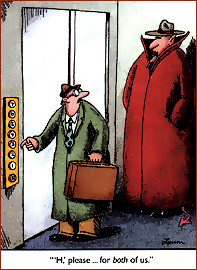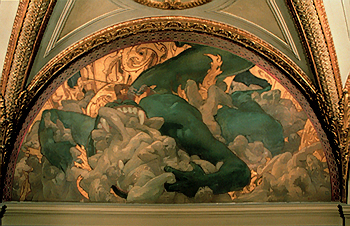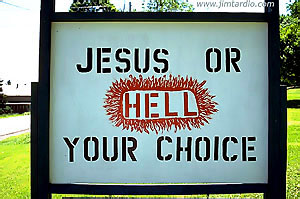Go To Hell
Sense & Nonsense About Eternal Damnation
If you're anything like me,
you've been sending people to Hell for years. As a figure of
speech, it ranks up there with some of the best. “Go to Hell,”
kind of rolls of your tongue and even the least articulate of us
can deliver the curse with some authority. Now, of course,
sending people to hell is a bad thing to do. Christian mythology
teaches us that Hell is, well, red. I'm not sure where the
notion of all that red came from, but it's likely more to do
with visceral blood imagery than any firsthand accounts of the
color of the devil's night club.
There's this notion of a plump, cherubic Devil, pitchfork and
tail, and his buddies partying hearty down there (hell is almost
universally thought of as “down,” or the “underworld”). Demons
dancing, partying through eternity, orgies in a psychedelic
haze. Too Hot by Kool & The Gang blaring over monstrous sound
systems. The quaint notion of hell is not entirely unappealing
to the more psychopathic extremes of our society, and a good
number of folks not only believe in hell, but are actively
working to achieve it.
As a comic book writer, I'm amazed that we are, by and large,
free to talk about Hell and Satan, but whenever we mention
Heaven and God, we have to paint with the broadest of brushes,
reverting to a kindly Christian mythology of disembodied voices
or silver-haired guys in dresses. But Satan we can interpret any
way we want. Satan Comics remain a big draw, while no major
comics publisher has even tried Christian or Jewish or Muslim or
Buddhist Comics on any appreciable scale. The companies are, by
and large, more frightened of the nutty Christians than they are
of the nutty Satan worshippers.




A longtime friend who practices the Wiccan faith used to work at
Marvel, and she was merely amused by how bad and how wrong the
Devil Comics were. But she took no real offense to it, they were
just comics. Her faith, at its most basic level, denies the
existence of a personal Satan, so the notion of Satan as a
super-villain (or even a super-hero, as several companies have
attempted) was farcical to her.
I was surprised by my affection for this woman and her family,
many of whom thought she was nuts (hell, she readily admitted
she was nuts), and I was fascinated by her expression of faith.
She was respectful of my own Christian beliefs, as many visitors
here are, and I mounted no holy crusade to get her to blow out
her candles. I did pray for her a lot, though.
Her expression of her belief system was my first inkling that my
own belief system, at the time a more naive fundamentalist grasp
of Christian myth, had many problems that needed to be
confronted and resolved. Among them the un-scriptural Christian
myth of Heaven and Hell.
Any child can tell you: Good people go to Heaven, Bad people go
to Hell. Many parents tuck their small children in at night with
this simplistic and horrifically erroneous anti-intellectual
perversion of scripture. By implication, this view of Christian
doctrine equates Heaven with Hell and, by extension, equates God
with the Devil: creating a view of two equal but diametrically
opposed forces.
Which is completely wrong. Despite what Christopher Lee and
Linda Blair may have told you, despite what you may have grown
up believing, Satan is not the opposite of God, is not in any
way God's equal. Evil is not the equal of Good, in the sense of
Satan being equal to God. The creation can never become the
equal of the creator. God, in His infinite Holiness, infinitely
dwarfs whatever power and authority Satan, His accuser and
rebellious angel, may have over this earthly plane of existence.
The fear Satan, or evil, evokes in us is a sinister lie, one
borne of our own ignorance of proper Biblical teachings of the
nature of evil and the evil one, who is, in essence and
practice, powerless before the God of all creation, yet who
works tirelessly to keep us blind to and ignorant of God's
majesty, dominion and power.
Jesus or Hell © 2002 Jim Tardio Photography. Used By Permission.
So, then, what are we to make of ol' Beelzebub
and his pals? As much as the choice to believe in God, belief
in a devil is a personal decision. However, belief in one does
not necessarily mean belief in the other. It's not Batman and
the Riddler. Not Holmes and Moriarty.
Christian myth is just that: a general acceptation of a largely
oral tradition of themes, concepts and neat little stories that
function much the same way fairy tales do, providing comfort and
pacification while glossing over tougher questions and providing
some semblance of something we accept for truth but which is, in
fact, not truth at all.
For example, John 1:3 says, “All things were made by him; and
without him was not anything made that was made.” A reasonable
syllogistic argument might be, God created everything. The
Devil, the personal dimension of that which opposes God's
purposes in His world, is a created being. Therefore, God
created evil.
The comforting simplicity of the Christian myth of Good People
Go To Heaven, Bad People Go To Hell, does not address this
problem, or any of hundreds of others any reasonable study of
theology would present. If God created evil, why would he punish
us for evil conduct? The myth, embellished by our human logic
and human desire for swift and reasonable conclusions to such
matters, comforts only the non-thinker. The myth applies
standards of morality and reasonable conduct to a God who is
beyond either. A God who chose, for reasons we may never
understand, to breathe life into creations who would inevitably
rebel against Him, requiring an unthinkable sacrificial gesture
to reconcile creation and creator.
The scriptures do not endorse a moral standard for access to
Heaven so much as they generally speak of heaven as a state of
being with God (Luke 23:43, I Thess. 4:17), and a Christian
Heaven as a place God is preparing for those whom He has
reconciled unto Himself (John 14).
Hell, on the other hand, is not in any way the equal of heaven.
“Hell” is an Anglo-Saxon word for a Greek concept of the land of
the dead. Careful inspection of the scriptural references to
Hell, or Gehenna or Sheol, or Tartaroo, creates a much stricter
concept of what this place may be. Matthew 25:41 tells us Hell
is a place prepared for the Devil and his fallen angels. It is
not a place prepared specifically for man, but Jesus made
allegorical statements alluding to Hell as a place of torment
for unrepentant sinners (Luke 16:19), and also alluded to Hell
as a base of power for the forces of evil in this world (Matthew
16:18).
There is no scriptural foundation for a belief that you are
sentenced to hell for being “bad.” Judgment against evil deeds
implies a morality that, to my belief, is not in practice.
Commensurate attempts to weigh the seriousness of or, I suppose,
volume of sin against the severity of punishment also seems at
odds with the concept of a Divine and Holy God, for whom sin is
sin: essentially human error and human weakness, that which
separates us from the Divine. In one view, spitting on the
sidewalk is just as worthy of hell as murder. And fundamentalist
Christians ready and willing to sentence, gee, I guess
everybody, to hell, are themselves guilty whenever they're
speeding on the interstate or littering in the park.

The notion of God sending people to hell
is a distortion of scripture. Certainly, the final act of the Bible
speaks of the forces of God conquering the forces of Satan and
tossing all the bad guys into the Lake of Fire (Rev. 20:10)
before the Ewoks Dance begins, but in terms of personal
responsibility, I find a different meaning in and purpose to
Hell.
My conviction is Hell is a place where God Is Not. Hell suggests
a separation from the Divine (Luke 16:26). A punishment? Well,
yeah, I guess, but I see it more as a choice: a choice to dwell
in the presence of God, or a choice not to. An omnipresent God,
by syllogistic argument, must be everywhere in existence at all
times. If Hell is indeed a place that exists within existence,
then God, therefore, must be there. Which, again, leans back
towards mythology as opposed to theology. In my view, theology
makes the argument that if God be God, He can make up his own
damned rules. If God, as a Divine and all-powerful being,
chooses to withdraw Himself from us, He certainly has the power
to transcend His own omnipresence to accomplish that. My
conviction is the total withdrawal of the Divine presence would
be a horror of untold magnitude. I am persuaded that God's
presence, the heart beating in our chests and the air rushing
through our lungs, is made manifest even to those who don't even
believe in Him. And everyone from the most ardent religious
fanatic to the most cynically jaded atheist would suffer a major
shock and revelation if God, even for an eyeblink, withdrew
Himself from us.
Which, of course, causes us some problems with this verse from
Psalms:
“Whither shall I go from thy spirit? or whither shall I flee
from thy presence? if I ascend up into heaven, thou art there.
If I make my bed in hell, behold, thou art there.” —Psalms
139:7-8
In this case, I believe David refers to himself as a conquering
child of God, not as one who has rejected God and, hence,
sentenced to hell. Here he speaks of Hell as a physical place,
the land of the dead, of Sheol, rather than the New Testament
place of torment. Empowered by and in the fellowship of the
Divine, we become conquerors, endowed with power, who certainly
could traverse the land of the dead and still remain in the
hands of an almighty God (Romans 8:38-39).
Is Hell a physical place? Maybe. I dunno. Where is it? Hoboken.
Seriously, these considerations are more apropos of Christian
mythology than they are of any reasonable or substantive
consideration of faith.
As for Good People going to heaven, Jesus said heaven will be a
place He is preparing for sinners saved by grace (John 3:17,
14:3). The premise being that sin entered the world when Eve got
jiggy with the snake (Gen. 3:6), and that the human race is,
therefore, no longer divine but is now carnal, and required a
divine sacrifice to reconcile rebellious man to a Holy God (Rom.
5:12). It's got less to do with being good as it does with
making a choice to live in the presence of The Divine.

I don't pretend to be a biblical scholar.
I just ramble on here, sharing little pellets of wisdom from my
exegetical Pez dispenser. But, in one man's opinion, there will
be a lot of rotten scoundrels in heaven. There will be a lot of
atheists in heaven (likely denying they're there). And there
will be a lot of really nice, really great, really wonderful,
decent and moral people in hell. To me, the whole issue of
destination has less to do with morality than it does with a
simple awareness of and fellowship with the Divine God. In my
Christian faith, this involves faith in and an acceptance of His
Son, Jesus Christ.
The final thought of what hell is and is not is a matter of
personal belief. My ongoing gripe with most organized religion
is their penchant for insisting, at times violently, on their
own interpretation of Truth, interpretations which are
constantly changing and constantly challenged even within their
own ranks. I don't think it's my job to tell you what to think.
I'd like to politely suggest that you think. We have too many
parishioners who sit benignly on Sundays letting us tell them
who God is and how to live their lives. That, to me, is the
Filenes's Basement of religious faith: the unquestioning lemur
who knows little or nothing of scripture and has not even my
cursory (at best) grasp of Biblical and historical theology.
My purpose here is not to tell you what hell is or is not
(though, of course, some may use this page for that purpose
anyway), but to get the discussion going. To get the thinking
going. Whether you're booked on a flight to heaven or Hoboken,
it's ultimately your call. Luckily, I'm not God, 'cause, believe
me, a lot of you would be in big trouble.
Christopher J. Priest
24 February 2002
editor@praisenet.org
TOP OF PAGE
An Incomplete List of People Who Should Go To Hell







